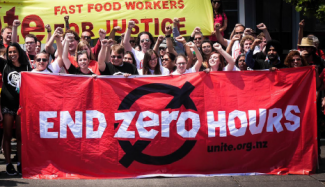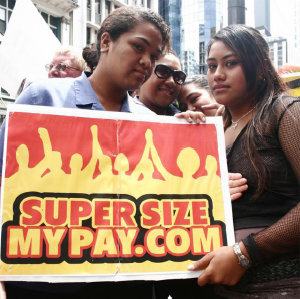Heroes of Zero
Workers rally public to force an end to zero hours contracts

THEY’VE DONE IT. New Zealand workers have freed themselves from zero hours contracts. The ultra-conservative government bowed to strong public pressure and made the contracts illegal in March 2016.
The zero hours one-way contracts are notoriously unfair. They bind workers to an employer with the promise of work—but only if, as and when it suits the employer.
The contracts require workers to be perpetually on call for work. But nothing is required of employers. They do not have to provide minimum hours of work, at set times, on specific days. Workers become captives of the whims of employers. Any refusal to work for any reason risks immediate termination.
That’s why New Zealand banned zero hours contracts. No ifs, no buts, no opt-outs.
The little union that could
Two years ago hardly anyone in New Zealand knew what zero hours were. The battle was led by a trade union that started with a mere 100 members. Their victory was even more remarkable because it depended on the bravery and organization of the workers at McDonald’s, Burger King and the rest of New Zealand’s fast-food outlets—workers who time and time again have proven to be hard to reach and/or organize.
The story of how a social crisis can lead to serious political action begins with a trade union called Unite. Just over a decade ago it was “a union without any members,” as Mike Treen, now its deputy head, remembers.
Unite mounted a two stage campaign. First, from 2005 Treen and his colleagues went all out to recruit workers from the industries other unions weren’t touching: fast-food chains, casinos, hotels. They did so with imaginative, popular activism. For example, the campaign to get union representation in the fast-food industry was called, Supersizemypay.

The campaign highpoint came with a mass picket of burger restaurants led not by union activists, but schoolkids in uniform. After all, they ate there—so
why not form an alliance between customers and workers? Television-worthy video of the demo made for excellent union marketing.
Second, came the battle over zero-hours contracts. Two years ago, Treen recalls, this was a term known only by the country’s well-read. The workers bound by these contracts had no understanding of how bad and extreme the contracts were. Once they got that, and heard there was a union campaigning against it, the fight back was on.
The public catches on
Crucial to this battle was a popular supper time TV show Campbell Live. In 2015 the show took up the issue of employment contracts as a campaign, appointing a correspondent to work on it full time, the show doing stunts on a nightly basis. Campbell recalls: “The kind of people who were driving Audis to dinner parties to drink pinot noir were decrying zero hours around their dinner tables.”
In an industry marked by a high number of Indian-origin workers, Unite did something else unusual: it asked Indian community groups to help with mobilizing. Few had heard of the Bhagat Singh society, for instance, but it was large and active—and took its ideal from the eponymous revolutionary socialist who was executed by the British Raj.
Not everything in this story can be readily applied to Canada. But it does go to show what imaginative activists can do when they decide to fight hard for what everybody can see is no more than fair.
Related Links:











Add new comment